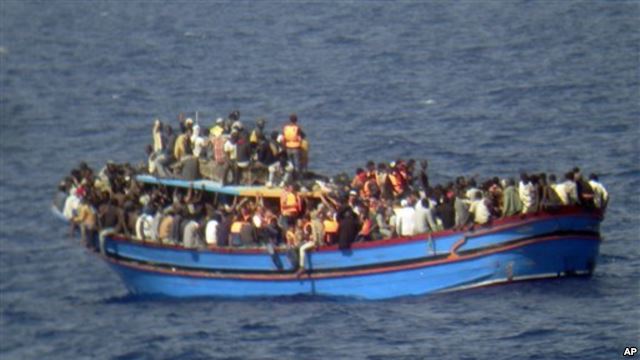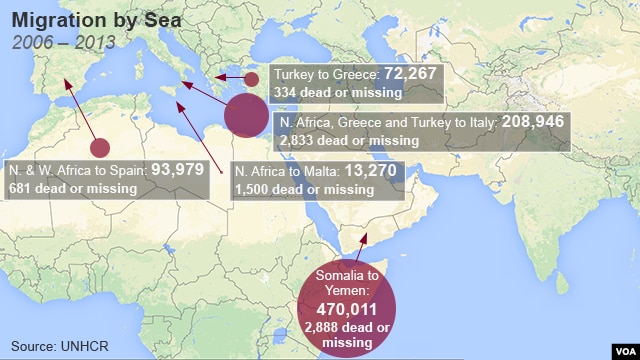
GENEVA—The United Nations High Commissioner for Refugees Antonio Guterres is appealing to nations to protect and come to the rescue of thousands of people embarking on dangerous sea journeys in search of asylum or migration.
Guterres is hosting a conference Wednesday and Thursday in Geneva to discuss rescues at sea, ways to encourage safer forms of migration and addressing the underlying causes of why people are fleeing their countries to begin with.
The meeting includes sessions focusing on the Mediterranean and the three other major routes for people making sea journeys. Those include the Gulf of Aden off the Horn of Africa, the Caribbean Sea, and the waters off Southeast Asia.
Guterres said some governments are prioritizing keeping out foreigners above considering asylum, and that they need to design policies that make sure “human lives do not end up becoming collateral damage.”
The agency estimates nearly 350,000 people have made dangerous sea crossings in search of asylum and migration this year. This has resulted in 4,272 reported deaths.
The most dangerous routes have been across the Mediterranean Sea, where more than 3,400 people have died in 2014. The area has seen a surge of activity with 207,000 people trying to make the trip, which the U.N. says is more than triple the previous high from 2011.
UNHCR spokesman Adrian Edwards notes that war and poverty in the Horn of Africa are pushing people across the Gulf of Aden. He says people from western Burma are taking deadly routes in Southeast Asia.
Edwards says the focus of the High Commissioner’s meeting is on saving lives. But he tells VOA it is difficult to do this without looking at the root causes that prompt people to take these dangerous journeys.
“Wherever we look, we are seeing people fleeing real difficulty,” he said. “And there comes the problem. If someone is fleeing a war, fleeing a conflict and trying to have a case for asylum or trying to seek a safe haven, if you turn them back, then all that happens is you simply increase the risks for those people.”
He says it is easier to see the problems than the solutions and that problems have to be addressed at the source. He says people have to consider what can be done along the routes to provide safe and legal means for migrants to apply for asylum or for travel visas.
The bottom line, adds Edwards, is that “deterrence alone does not work to solve this problem. Dealing with criminal networks alone does not solve the problem. You have to look at it in its entirely and deal with it. It is a transnational problem. It needs transnational thinking and solutions.”
Edwards says the shift in many countries “in favor of border protection, rather than protection of lives of people arriving in countries” is a problem that has to be looked at.
“We understood the moods in many countries in these difficult times with record levels of displacement,” he added. “But the basics have to remain in place. We have to uphold the human rights and the right to asylum, which have been so much a part of our humanity in the entire Second World War-post Second World War Era. It is important that those are maintained.”
Criminal activity
Participants at the High Commissioner’s meeting agree that much of the international focus on sea migration is on the irregular or criminal nature of this activity.
They stress that the people undertaking these journeys are not the criminals but are the victims of criminal gangs that traffic in the desperation of others for profit.
They say it is the right thing for nations to prevent this exploitation and to provide protection and hope to asylum seekers and migrants seeking a better future.
The UNHCR has warned about the number of people becoming victims of organized crime, saying that smuggling networks are “flourishing” and profiting from humans who are desperate to try to get to another country.
In a background document prepared for the meeting, the agency said refugees and people seeking asylum or a better life someplace else are often packed aboard flimsy vessels run by ruthless groups, and that many are “beaten, raped, tortured or tossed overboard.”
It stresses the need to first to protect people’s basic rights by ensuring anyone found in distress at sea is rescued. It further calls for nations to examine how they can expand regular opportunities for migration with things like humanitarian visas, increasing the number of people admitted for resettlement or expanding family reunification opportunities.
The U.N. says whatever progress is made will come down to better national and regional cooperation and coordination, and that not doing so will have “stark” humanitarian, political and financial costs.
Source: Voice of America









